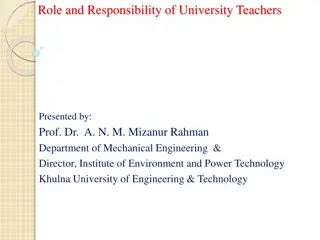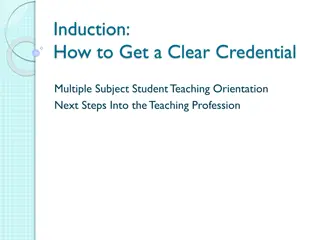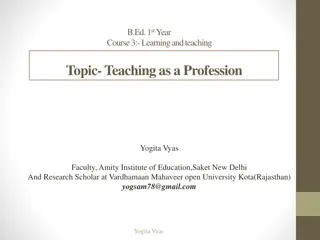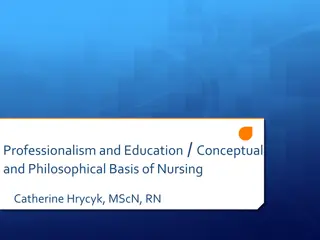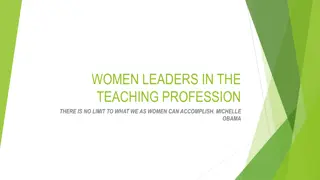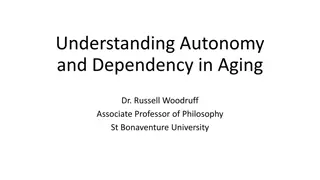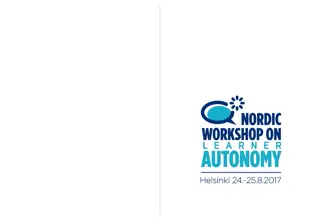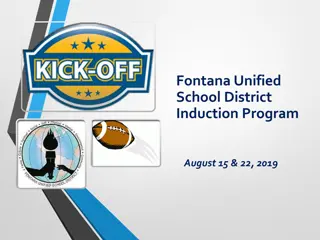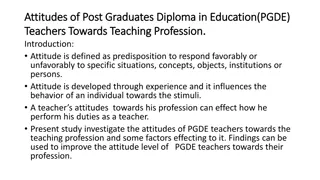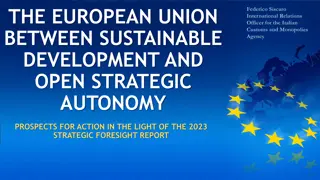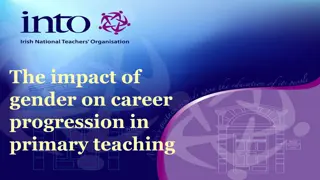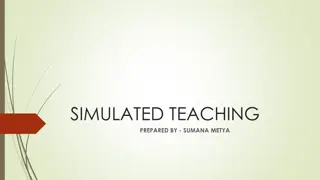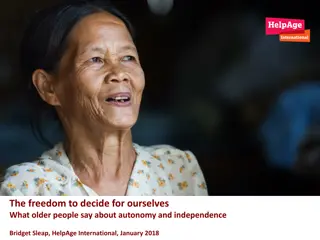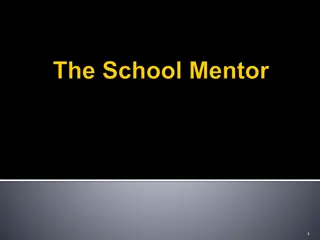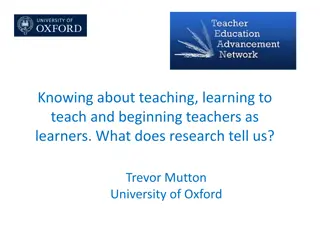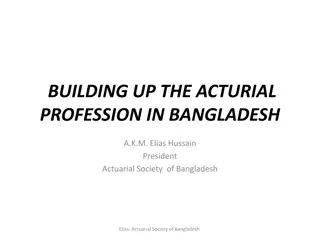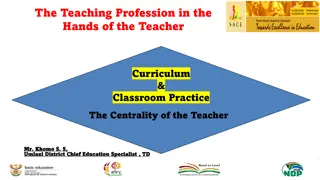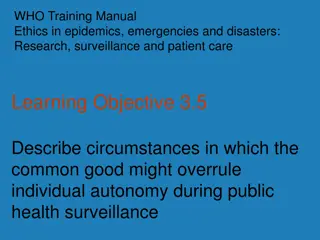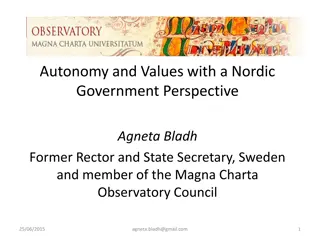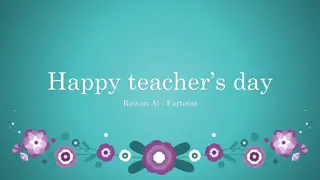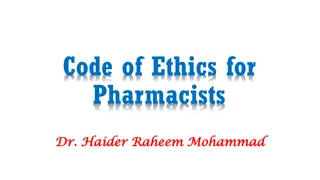Empowering Teachers: Autonomy, Agency, and Accountability in the Teaching Profession
The significance of teachers in education is highlighted, emphasizing autonomy, agency, and accountability. The role of teachers in student learning outcomes and the global agenda for teacher empowerment and quality education is discussed.
Download Presentation

Please find below an Image/Link to download the presentation.
The content on the website is provided AS IS for your information and personal use only. It may not be sold, licensed, or shared on other websites without obtaining consent from the author. Download presentation by click this link. If you encounter any issues during the download, it is possible that the publisher has removed the file from their server.
E N D
Presentation Transcript
TEACHERS AS PROFESSIONALS: AUTONOMY, AGENCY & ACCOUNTABILITY SACE INAUGURAL NATIONAL TEACHERS CONFERENCE 2023 The teaching profession in our hands, our voices and plight matter 20 and 21 April 2023 Yusuf Sayed
Importance of teachers and teaching Unpacking autonomy, agency & accountability Autonomy, agency and knowledge claims OUTLINE Autonomy, agency and teacher/teaching standards Moving Forward 2
The quality of an education system cannot exceed the quality of its teachers (Barber and Mourshed, 2007:19) useful but only partly true Teachers account for about 75% of education budgets a number of studies have found that teacher effectiveness is one of the most important school-based predictors of student learning after home background. In the classrooms of the most effective teachers, students from disadvantaged backgrounds learn at the same rate as those from advantaged backgrounds (Hamre & Pianta, 2005) Teachers tend to be held in high esteem at socio-cultural level by the local communities. 3
TEACHERS AT THE CORE OF GLOBAL AGENDA 2030, substantially increase the supply of qualified teachers, including through international cooperation for teacher training in developing countries, especially least developed countries and small island developing States (Target 4.c, United Nations, 2016). Revitalize the teaching profession to ensure quality and relevance at all levels (African Union Continental Education Strategy, the 2063 Framework) 4
INCHEON DECLARATION (2015) We will ensure that teachers and educators are empowered, adequately recruited, well-trained, professionally qualified, motivated and supported within well-resourced, efficient and effectively governed systems . 5
UNPACKING AUTONOMY, AGENCY, AND ACCOUNTABILITY
Contestation about what it means to be a teacher and to be part of the teaching profession Doctors lawyers Workers Nurse , And/or . 7
What a teacher is is based on several claims Knowledge claim Autonomy claim Agency claim Service orientation claim Belonging claim Within context 8
A defined body of knowledge Service motive Restricted entry Profession a focus on the core Code of conduct/ethics Professional association Involvement and determinati on in key policy maters - social dialogue 9
Agency, in other words, is not something that people can have; it is something that people do or, more precisely, something they achieve (Biesta & Tedder, 2006). It denotes a quality of the engagement of actors with temporal-relational contexts-for-action, not a quality of the actors themselves. Viewing agency in such terms helps us to understand how humans are able to be reflexive and creative, acting counter to societal constraints, but also how individuals are enabled and constrained by their social and material environments. THE IDEA OF AGENCY Priestley et al 2015 10
teacher agency is , conditioned in differentiated ways by the context teachers find themselves in. There are 3 interrelated ways in which this is I. experiential determination. Social class and wealth determines much of the lived realities s such as where individuals live, where they go to school, and who their friends are. This segregated experiential determination using the fault line of social class is overlaid with issues of race, gender, ethnicity and geographical history. Teacher agency is thus to a large extent shaped by the social class determined basis of the everyday lived experience. 11
ii. Agency is determined within institutions teachers work. What it means to be a teacher continues to be shaped by contours of colonial and apartheid institutional configurations that are overlaid by new forms of inequities. 12
iii.Agency is determined by the professional support that teachers receives (and the quality thereof). ITE, NQT, and CPD curricula shapes the ways in which agency is activated, realised, and manifest in school and classroom contexts 13
Context thus punctuate forms of agency facilitating and inhibiting it in contingent and unequal measures. These determinations suggest the agency of teachers then is enacted in spaces that are segmented and separated, with tools that are shaped by experience and institution, and in ways that are productive in as much as they are barren. 14
ACCOUNTABILITY: WHO, WHAT FOR WHAT PURPOSE , WHAT MEASURES & HOW ii. For what To Who: Learners? Parents? Community? State? Learning outcomes narrow to broad Safe and inclusive learning spaces Societal benefits?? 15
iii. What Purpose iv. What measures Learner assessment scores iv. External Compliance, parliament - spending to regulations Peer/external rating according to teacher/teaching standards v. Internal: leaner achievement and life chance progression, quality of teaching Parental/learner satisfaction rating Self measures 16
Self regulation Bureaucratic and managerialist accountability vs. Democratic and professional forms of accountability School/Community regulation State regulation Professional Body regulation 17 DIVERSE ACCOUNTABILITY FORMS
AUTONOMY, AGENCY AND THE KNOWLEDGE CLAIMS
No general agreement on whether or not there is a professional knowledge base: GEP frameworks have led to recruitment of para teachers with some skills training GEP frameworks have also promulgated ideas about good teacher National policies have suggested university/school based TE IS THERE A PROFESSIONAL KNOWLEDGE Multiple, competing, inconsistent, shifting and evolving ideas of knowledge base for teachers BASE UNDERLYING TEACHERS WORK? However, each of these views is based on a frameworks of assumptions about teacher knowledge even if knowledge is equated with minimum skills or outcomes Core to the knowledge claim is that teachers make a difference to what leaners learn in the classroom pedagogy the unknown which we need to know more about 19
Knowledges about learners and context Courses about Theory, foundations of education Knowledges about the affective Course that support the development of diversity and values - includes courses such as inclusive education, social justice, social cohesion Knowledge about areas/phase Clear aims and goals for the programme aligned to national curricula Teaching practicum (supporting professiaonlly teacher practice in the form of clinical practice is core to an ITE programme design) Knowledges about teaching as a profession Courses that enhance understading of teacher status, roles, codes of conduct, laws - courses that support that development of teaching as a profession Knowledges about teaching courses that support the acquisition of content and pedagogic content knowledge of teachers (CK, PCK) Knowledges about general pedagogy Course about general pedagogy such as classroom management (eg. Professional didactics module) 20
A HEURISTIC FRAMEWORK FOR F TEACHERS' AGENCY Individual - knowledge, competence, beliefs and values Teacher Agency and leadership for effective teaching Context/structural - nature of community, policy, system governance Relational - peers, school leaders, Representational - involvement in policy making/determinat ion, say over working conditions 21
CONCEPTIONS OF TEACHERS AND AUTONOMY AND AGENCY
Mechanisms of global governance of teachers are being transformed: From education as (national) development and standard setting to learning as (individual) development and competitive comparison. SHIFT IN GLOBAL Orchestrated by key global agencies GOVERNANCE OF TEACHERS Based on the argument there is a crisis in the teaching profession The crises could be solved by the global actors through teacher governance 23
CHANGING IDEAS OF A GOOD TEACHER Competent Teacher Model (2000s) Reflective Practitioner Model (1970s) Scholar- Teacher Model (1960s) 24
CONCEPTIONS OF GOOD TEACHER AND GOOD TEACHING (CETE, 2021) Malaysia Hong Kong Who sets the standards Ministry of Education Committee on Professional Development of Teachers and Principals (COTAP); Council on Professional Conduct in Education (CPC) & Education Bureau (EDB) Nature of the organisation Central Government Non-statutory, advisory role Required to update their students with current developments in technology, current affairs of the world and develop their entrepreneurial skills so they can compete with the changing world. Expected knowledge and skills for practice Thorough subject-content knowledge, knowledge of using ICT for teaching, design and implement teaching methodologies that are rooted in research Belief in God, display patriotism, patience, fairness, competitiveness, being active and healthy, interpersonal and intrapersonal skills Beliefs and values required of teachers Not specified No licensing/registration. Public school teachers need to undergo a 3 three year probation as education officers and are given permanent appointments based on performance As per the Education Ordinance, which empowers EDB for teacher registration and de-registration based on meeting the standards Regulations 25
The neo-liberal shift in education has increasingly subjected teachers to managerialist forms of regulation and accountability. Payment by results, performance related pay, increased auditing of teacher work, insecure and temporary work contracts and recruitment of para teachers frame teachers as the problems requiring surveillance. Professional autonomy and self-regulation is supplanted by externally driven forms of regulation with mechanisms and tools that narrowly measure teacher efficacy by learner assessment results. Sifts the locus of blame onto individual teachers. In individualising education failure as the failure of teachers and teaching, and in ignoring the socio-political and cultural context in which teachers work, the state removes itself from the sphere of public critique; state failure and the increasing commodification of education in a neo- liberal capitalist order are removed as objects of critical engagement. 26
Discourses of derision balanced by discourses of salvation and hope. In the former, policy and media portray teacher behaviour, teacher knowledge, teacher skills and teacher attitudes and values negatively to suggest that they do not work for the good of society or for their learners or communities. In the latter discourse, national and policy media reach out to teachers to valorise their labour and invoke a historical moment of teacher status in the past. Policy attention pertains to teacher professional development to address both the policy problem of teacher knowledge, skills and dispositions and, at the same, to empower teachers to be part of the policy solution . 27
TEACHER BEYOND WESTERN CENTRIC NOTIONS Decolonial meanings e.g guru/ustaad/Griot as referring to influential and popular experts is widespread in living traditions of South Asia/Africa, secular and religious, indicative of the existence of formally recognised role of pedagogues and educational systems in pre and post-colonial times. It involves the transmission of a range of knowledge forms in maily oral forms religious; spiritual; metaphysical; epistemological and rhetorical; state-craft and law; sciences such as medicine, architecture and astrology; grammar and linguistics; as well as performance (music, dance and drama) and visual arts and crafts. These epistemic structures are often gendered, caste-based, ethnic- based and religiously circumscribed, with injunctions and proscriptions on who is worthy of receiving particular knowledge, which in turn maps onto the social stratifications and hierarchies 28
AUTONOMY, AGENCY AND TEACHER STANDARDS
EI/UNESCO Global Framework of Professional Teaching Standards (2019) 30
Robinson (2012) discuses the generation of standards as of wider set of neo-liberal reforms which seek to regulate and surveil teachers Raewyn Connell speak about an audit culture breaking the idea of teachers as reflexive professional, transformative intellectuals REGULATION AND SURVEILLANCE Teacher need to engage with external, public facing accountability is this a move to or away from public accountability The paradox: regulate teacher but standards cannot be negotiated without teachers a mixture of ownership by associations/unions and control 31
The act of teacher accreditation licensing Should standards be linked to licensing? STANDARDS AND LICENSING Should professional development be linked to licensing Should standards be linked to professional development? 32
A new vision needed Moving beyond an idealised, romanticised account of the past and the contemporary neo-liberal thrust of surveillance accompanied by a narrow instrumentalist view of teachers and their work,, requires that a critical humanist agenda be adopted towards teachers, their work and their professional development. A critical humanist agenda understands the practices of teaching and teacher education as a relational activity involving teachers in multiple relations taking a normative stance in favour of social justice and equity in and through education BALANCING AUTONOMY AND AGENCY WITH PROFESSIONAL AND DEMOCRATIC ACCOUNTABILITY 34
Agency of teachers requires involving teachers in Agency of teachers requires education systems that: Policy determination Identifying what they need professionally, but also what is appropriate to their own learning Functioning and effective Are supportive of the work of teachers in their diverse school and classroom context Transparent, fair and equitable in decision making Provide teachers with regular, and sustainable professional development including encouraging teachers to with their peers and in communities of practice 35
Agency of teachers requires teachers to render themselves as accountable professionals to Learners for their teaching To parents and the state to account for their professional work [balancing intrinsic and extrinsic forms of accountability] Agency of teachers requires teacher autonomy and choice in Mediating the curriculum in their classroom Pedagogic enactment 36
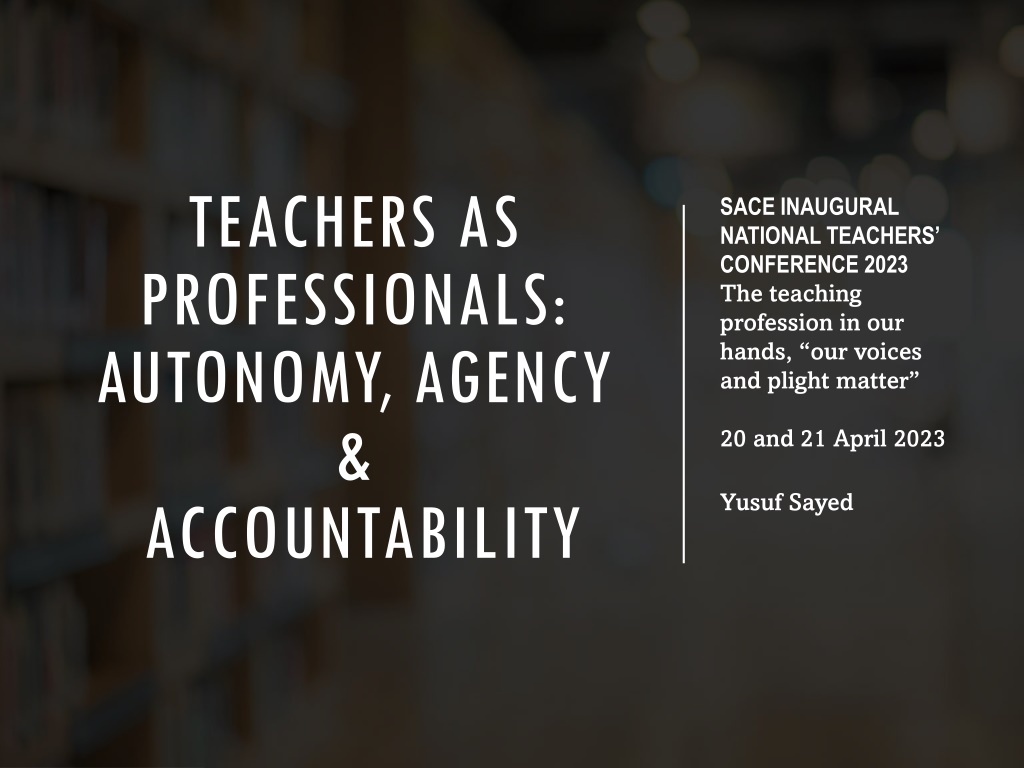
 undefined
undefined


































